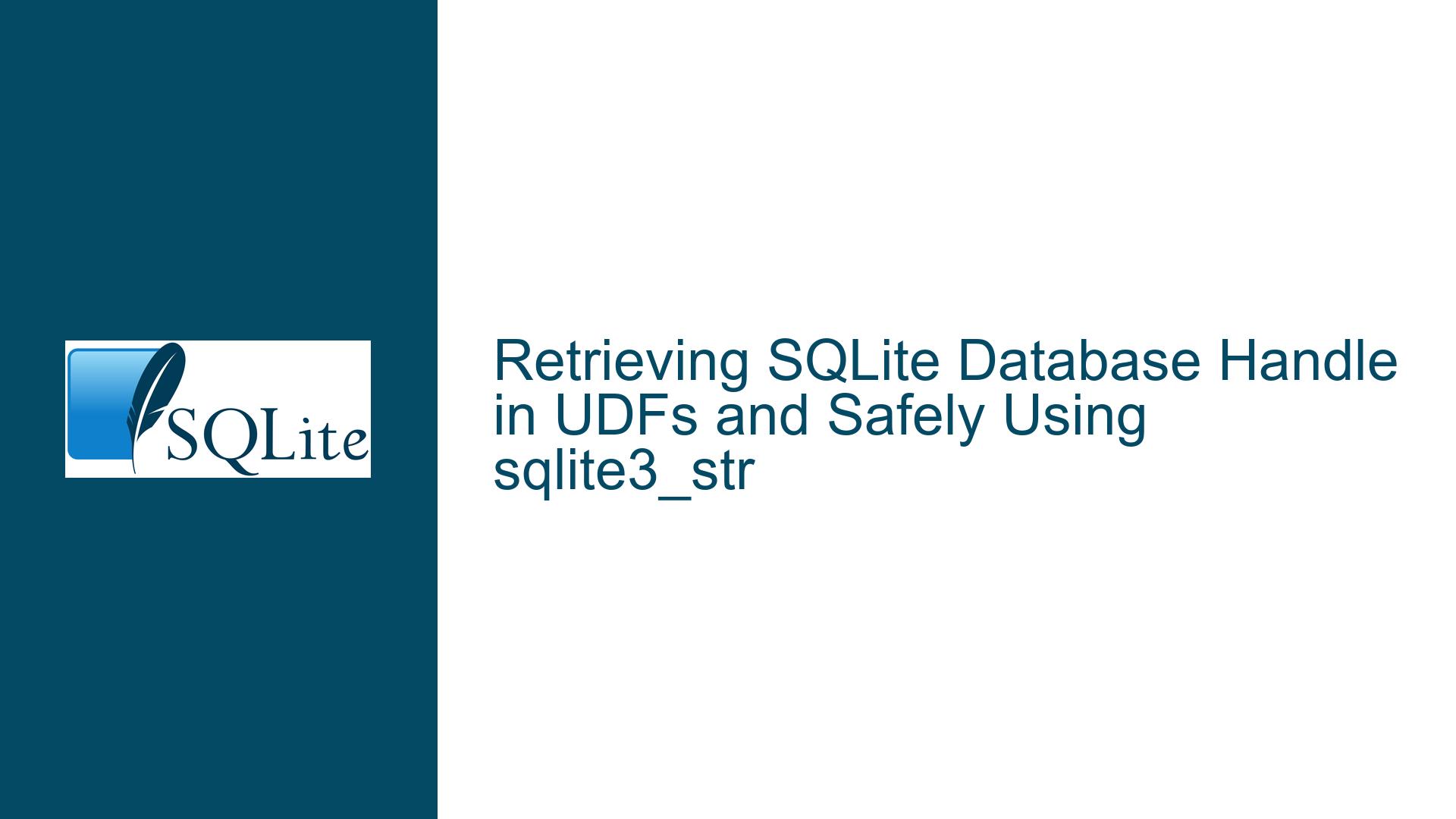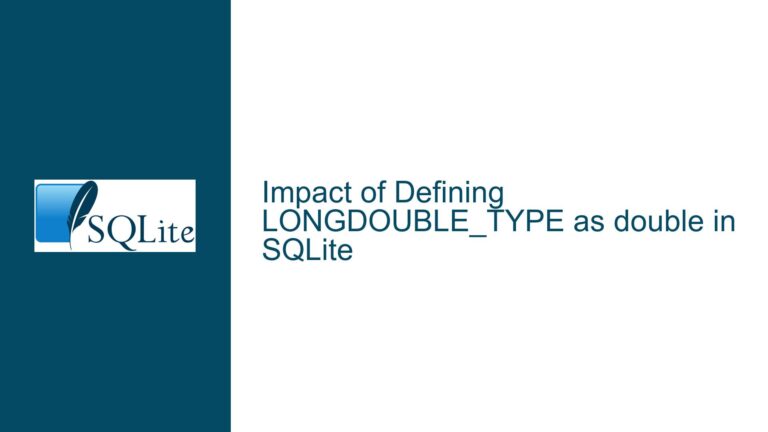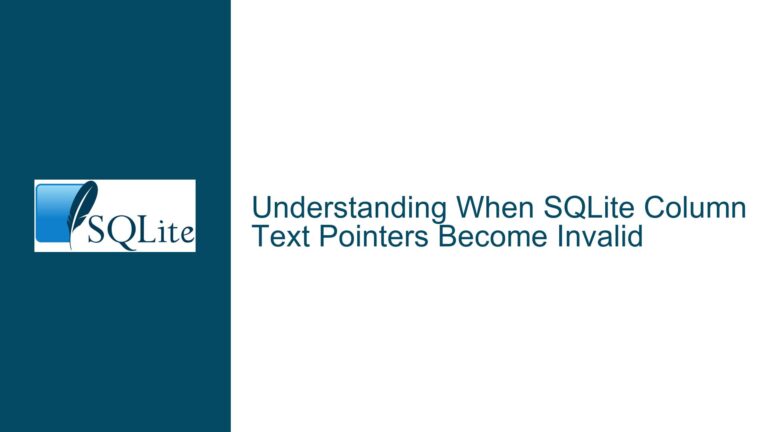Retrieving SQLite Database Handle in UDFs and Safely Using sqlite3_str
Accessing Database Handles and Managing String Builders in Custom SQLite Functions
Obtaining the Database Handle from a User-Defined Function Context
When developing user-defined functions (UDFs) in SQLite, a common requirement is accessing the underlying sqlite3* database handle from within the UDF’s implementation. This need arises when utilizing APIs that explicitly require the database handle, such as sqlite3_str_new(), which initializes a dynamic string builder for efficiently constructing large strings. The challenge lies in correctly retrieving the database handle from the sqlite3_context* object provided to the UDF.
The sqlite3_context* parameter, which represents the execution context of the UDF, contains metadata about the function call, including a reference to the database connection. However, the method to extract this handle is not immediately obvious from the public API documentation. Failing to retrieve the handle properly will result in runtime errors or undefined behavior when attempting to use APIs that depend on it. For example, passing an invalid or null handle to sqlite3_str_new() may lead to incorrect memory management or error reporting.
In the scenario where a UDF processes binary large objects (BLOBs) and converts them into JSON arrays, efficient string construction is critical. The sqlite3_str API provides a performance advantage over repeated string concatenation, but its dependency on the database handle necessitates a precise retrieval mechanism. Missteps here can cause memory leaks, corrupted output, or application crashes.
Causes of Invalid Database Handle References and String Builder Misuse
The root cause of errors in this context typically stems from one of three issues:
Incorrect Retrieval of the Database Handle: The UDF author may not know the existence of
sqlite3_context_db_handle(), the function designed to extract thesqlite3*handle from the context. Attempting to derive the handle through indirect means—such as global variables or thread-local storage—introduces race conditions and violates the thread-safety guarantees of SQLite.Improper Initialization of the String Builder: Passing a null or uninitialized
sqlite3*handle tosqlite3_str_new()can lead to undefined behavior. While thedbparameter is technically optional (allowingNULL), omitting it disables error propagation to the database connection. This means errors during string building (e.g., memory allocation failures) will not trigger SQLite exceptions, potentially leaving the UDF in an inconsistent state.Lifetime Management of the
sqlite3_strObject: After callingsqlite3_str_finish()to finalize the string builder and obtain the resulting string, thesqlite3_strobject becomes invalid. Accessing or modifying it afterward constitutes use-after-free, which may corrupt memory or crash the application. Similarly, neglecting to free the finalized string viasqlite3_free()(when usingsqlite3_result_text()) results in memory leaks.
Resolving Database Handle Retrieval and String Builder Lifecycle Issues
Step 1: Correctly Retrieve the Database Handle
To obtain the sqlite3* handle from the UDF context, use the sqlite3_context_db_handle() function. This function is explicitly designed for this purpose and guarantees a valid handle as long as the context is active. Implement this as follows:
sqlite3 *db = sqlite3_context_db_handle(context);
sqlite3_str *json = sqlite3_str_new(db);
If the db handle is not required for error reporting (e.g., in a UDF that does not execute additional SQL statements), passing NULL to sqlite3_str_new() is permissible. However, this approach suppresses error messages related to the string builder, making debugging more challenging.
Step 2: Validate and Format the Input BLOB
Before processing the input BLOB, ensure its byte length is a multiple of sizeof(double) (typically 8 bytes). This prevents reading out-of-bounds memory:
int blob_size = sqlite3_value_bytes(argv[0]);
if (blob_size % sizeof(double) != 0) {
sqlite3_result_error(context, "Invalid BLOB size for double array", -1);
return;
}
double *float64array = (double *)sqlite3_value_blob(argv[0]);
int nn = blob_size / sizeof(double);
Step 3: Construct the JSON Array Safely
Use sqlite3_str_appendf() with a format specifier that avoids unintended scientific notation. The %g specifier is preferable for floating-point numbers:
sqlite3_str_appendchar(json, 1, '[');
for (int ii = 0; ii < nn; ii++) {
sqlite3_str_appendf(json, "%g", float64array[ii]);
if (ii < nn - 1) {
sqlite3_str_appendchar(json, 1, ',');
}
}
sqlite3_str_appendchar(json, 1, ']');
Step 4: Finalize the String Builder and Return the Result
Call sqlite3_str_finish() exactly once to finalize the string and release the builder’s resources. Pass the result to sqlite3_result_text() with the sqlite3_free destructor:
char *result = sqlite3_str_finish(json);
sqlite3_result_text(context, result, -1, sqlite3_free);
Critical Note: After calling sqlite3_str_finish(), the json object must not be used. Any further calls to sqlite3_str_appendf() or sqlite3_str_appendchar() will attempt to access freed memory.
Step 5: Handle Edge Cases and Errors
- Empty BLOBs: If
nnis zero, return an empty JSON array ("[]") instead of propagating an error. - Memory Allocation Failures: If
sqlite3_str_new()returnsNULL(unlikely in practice), abort the UDF and report an error viasqlite3_result_error_nomem(context). - Invalid Inputs: Check for
NULLBLOBs usingsqlite3_value_type(argv[0])and returnSQLITE_NULLif necessary.
Step 6: Register the UDF Correctly
When registering the function with sqlite3_create_function(), specify the appropriate parameters to ensure deterministic behavior and type safety:
sqlite3_create_function(
db,
"tofloat64array",
1, // Number of arguments
SQLITE_UTF8 | SQLITE_DETERMINISTIC,
NULL,
&sqlite_tofloat64array_func,
NULL,
NULL
);
The SQLITE_DETERMINISTIC flag informs the query planner that the function always returns the same output for identical inputs, enabling optimizations like caching.
By adhering to these steps, developers can safely integrate sqlite3_str into UDFs, efficiently construct JSON outputs, and avoid common pitfalls related to database handle management and object lifecycle.






